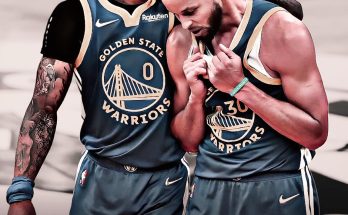Chiefs wide receiver Rashee Rice is set to stand trial in January in a civil lawsuit related to the six-car crash he was involved in earlier this year.
Kansas City Chiefs wide receiver Rashee Rice finds himself at the center of a legal storm as he prepares to face a jury trial in January stemming from a civil lawsuit related to a six-car crash that occurred earlier this year. The crash, which took place on a busy Dallas highway, has not only generated significant media attention but also raised serious questions about accountability, personal conduct, and the responsibilities of public figures both on and off the field. As the proceedings draw closer, this case has become a defining moment for Rice, whose NFL career and public reputation are now hanging in the balance.
The incident occurred during the offseason, when Rice was allegedly involved in a high-speed street race that ended in a devastating multi-car collision. According to authorities, Rice was driving a luxury sports car at a dangerously high speed when the accident happened. Initial reports indicated that Rice and another driver lost control of their vehicles, resulting in a chain-reaction crash that ultimately involved six cars. Several people were injured, and the extent of the damage was significant. What made matters worse was that Rice reportedly fled the scene, an action that intensified public scrutiny and legal consequences.
As news of the crash broke, the response from the NFL community was swift and varied. Fans were shocked, analysts speculated about disciplinary action, and the Chiefs organization issued a carefully worded statement acknowledging the situation while withholding judgment until more facts were known. For Rice, who had just completed a breakout rookie season with Kansas City, the timing couldn’t have been worse. He had become one of quarterback Patrick Mahomes’ favorite targets and was expected to play an even larger role in the offense moving forward. The crash instantly cast a shadow over his rapid ascent.
The civil lawsuit, filed by multiple victims of the crash, seeks substantial financial damages for medical bills, property damage, and emotional trauma. Attorneys representing the plaintiffs have described the incident as “reckless and avoidable,” asserting that Rice’s behavior behind the wheel that day demonstrated a blatant disregard for public safety. They argue that, given Rice’s status and resources, he should have known better and acted more responsibly. The suit points to a pattern of immature decision-making that, if left unchecked, could have even more serious consequences in the future.
Rice’s legal team, meanwhile, has maintained that he is cooperating with authorities and that he is committed to taking responsibility for his role in the incident. They have not confirmed the specific nature of their defense but have hinted that they will challenge key elements of the plaintiffs’ claims, including the assertion that Rice alone was responsible for the crash. Some legal experts believe the case may ultimately hinge on forensic evidence, eyewitness testimony, and traffic camera footage, all of which could provide critical insight into what exactly happened on the day of the crash.
The decision to schedule a jury trial in January adds an extra layer of complexity to Rice’s future. Not only does it coincide with the heart of the NFL postseason, a time when the Chiefs are often competing for playoff positioning or deep into a Super Bowl run, but it also places his availability for games in serious question. If the trial proceeds as planned and Rice is required to be in court for an extended period, he could miss practices or even games. For a team that relies heavily on its offensive weapons, this uncertainty could prove to be a major distraction and a logistical headache.
Chiefs head coach Andy Reid has, to this point, remained diplomatic when addressing questions about Rice’s legal troubles. He has expressed confidence that the young receiver is learning from the situation and reiterated the importance of personal growth and accountability. However, Reid also acknowledged the seriousness of the matter and the possibility that team discipline—or league intervention—could come into play depending on how the trial unfolds. The NFL has not yet issued any formal disciplinary ruling under its personal conduct policy but is reportedly monitoring the situation closely.
This is not the first time an NFL player has faced legal repercussions for off-the-field behavior, and it likely won’t be the last. However, the specifics of Rice’s case—and the fact that he’s a key contributor to one of the league’s most high-profile teams—make it particularly noteworthy. If found liable in the civil case, Rice could be ordered to pay significant monetary damages. While such a ruling wouldn’t necessarily result in jail time or criminal penalties, it could severely impact his financial future, especially if sponsors or endorsement deals decide to distance themselves from him.
The trial also brings into sharp relief the broader discussion about athletes and their off-field conduct. While professional football players often enjoy fame, wealth, and adoration, they are not above the law. Incidents like this one remind fans and organizations alike that with great visibility comes great responsibility. NFL players, particularly younger ones, must navigate a unique set of challenges that include sudden wealth, intense media scrutiny, and the pressure to perform—not just on Sundays but in the public eye every day.
Rice’s situation also raises questions about mentorship within NFL organizations. Are young players being adequately prepared for the realities of fame and fortune? Are there enough support systems in place to help them make responsible decisions off the field? In recent years, many teams have expanded their player development and education programs, offering seminars on financial literacy, legal awareness, and mental health. Still, incidents like Rice’s crash suggest that more work needs to be done.
As the legal battle looms, Rice has continued to train and prepare for the upcoming NFL season. He’s participated in team activities, albeit under a cloud of uncertainty. Teammates and coaches have largely refrained from commenting publicly on the lawsuit, instead focusing on football. Behind the scenes, though, there’s little doubt that the organization is preparing for all possible outcomes, including the possibility that Rice may not be available for part—or all—of the season.
If Rice is able to navigate this legal challenge successfully, it could serve as a major turning point in his career. Some players have emerged stronger after dealing with personal adversity, using the experience as a wake-up call and a catalyst for change. Others have struggled to recover from similar controversies, finding that the court of public opinion can be just as harsh as any legal judgment. The path forward for Rice will depend not only on the outcome of the trial but also on how he chooses to respond—both legally and personally.
For now, all eyes will remain on the January court date. It promises to be a dramatic and closely watched event, especially given the high-profile nature of the case and the personalities involved. The legal system will have its say, but so too will fans, sponsors, and the league itself. The ripple effects of the trial could stretch well beyond the courtroom, influencing team dynamics, public perception, and even league policy.
Rashee Rice is still at the beginning of what could be a long and successful NFL career. He has shown flashes of brilliance on the field, displaying the speed, hands, and playmaking ability that made him a second-round draft pick and a key figure in the Chiefs’ offense. But this legal challenge is a stark reminder that talent alone is not enough. To succeed in the NFL—and in life—requires discipline, maturity, and the ability to learn from mistakes.
As the countdown to January continues, Rice will be under the microscope. Every move he makes, every statement he issues, and every action he takes will be scrutinized. The jury trial may ultimately determine his legal fate, but the larger story is still being written. Whether he emerges from this ordeal stronger and wiser, or whether it derails the promising trajectory of his career, remains to be seen. One thing is certain: the stakes have never been higher.


